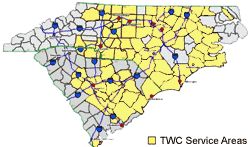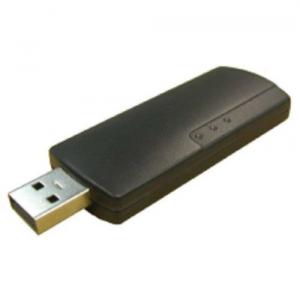Sunday was an exciting day for the nearly 200 residents of rural Mechanicsburg, a small community in southwest Virginia. It was launch day for the community’s new wireless “broadband” service, which turned the community into one large hot-spot, bringing Internet access to the community at speeds beyond dial-up.
The service expands on a Wireless ISP (WISP) network already serving the nearby communities of Rocky Gap and Bastian, and was funded by a broadband grant, with assistance from Rep. Rick Boucher (D-Virginia).
Residents can subscribe to the service, transmitted from an antenna tower located in each community, or visit the local community center, which will have computers available for Internet use.
 While the service represents an improvement over dial-up, it’s not exactly 21st century broadband.
While the service represents an improvement over dial-up, it’s not exactly 21st century broadband.
The service, provided by Trificient Broadband Technologies, uses Frequency Hopping Spread Spectrum technology in the unlicensed 900MHz, 2.4 and 5.8GHz bands (also used by consumer wireless phones and wireless routers).
Last fall, Trificient owner Jim Ingram told SWVA Today that he defined broadband at anything above 256kbps. Bland County’s BCNet WISP service provides 512kbps service for $27.95 per month with an annual contract and $99 installation fee. The Federal Communications Commission currently defines broadband service at speeds of 768kbps or faster.
Providing wireless Internet service in the hilly terrain of southwestern Virginia can be challenging. The antennas delivering the service have been mounted on antenna towers to be above nearby obstructions, and Ingram told the newspaper every customer gets an on-site survey to determine whether they can receive the service. If they are within 10 miles of the antenna and have a reasonably clear signal, a small antenna is mounted on the customer’s home and service can begin.
The company offers faster service for a higher price, assuming the customer is close enough to the transmitter to be able to obtain higher speeds.
For rural customers with no option for cable television or DSL service, wireless service at these speeds can provide basic connectivity for e-mail and web page access, but utilizing the Internet’s higher bandwidth services like video and other streaming media can prove challenging.
[flv width=”320″ height=”240″]http://www.phillipdampier.com/video/WVVA Bluefield Mechanicsburg VA Gets Wireless Broadband 10-12-09.flv[/flv]
WVVA-TV Bluefield/Beckley, West Virginia covers the October 11th launch day in Mechanicsburg as wireless Internet service begins for nearly 200 residents in rural Virginia. [2 minutes]


 Subscribe
Subscribe






